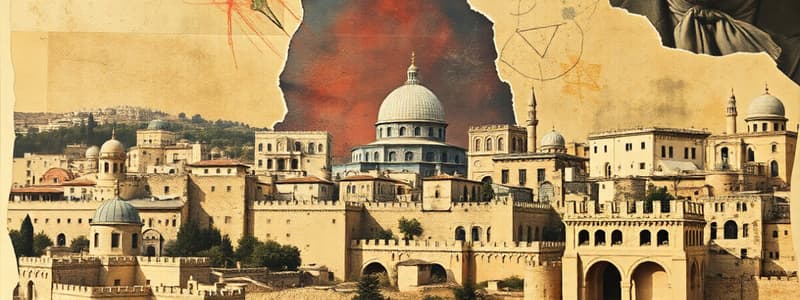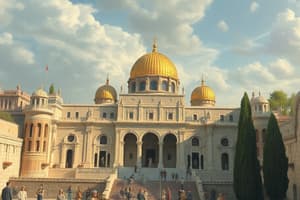Podcast
Questions and Answers
What prompted Matthias and Joseph to pause their toasts?
What prompted Matthias and Joseph to pause their toasts?
- A sudden rainstorm
- The sound of brass fanfare (correct)
- A bell ringing in the distance
- The arrival of guests
What routine did Matthias refer to when speaking with Joseph?
What routine did Matthias refer to when speaking with Joseph?
- Celebrating Easter with family
- Guiding children to view presents on Christmas morning (correct)
- Leading children to the dinner table
- Going to the Temple for prayer
How did Joseph respond to Matthias' anticipation of celebrating Christmas?
How did Joseph respond to Matthias' anticipation of celebrating Christmas?
- By expressing surprise (correct)
- By questioning Matthias' faith
- By expressing enthusiasm for the holidays
- By dismissing the celebration
What does Matthias suggest has changed about Christmas in his country?
What does Matthias suggest has changed about Christmas in his country?
What did Matthias feel as he stood in the sunlight?
What did Matthias feel as he stood in the sunlight?
What was the perspective of Matthias when viewing Jerusalem for the first time?
What was the perspective of Matthias when viewing Jerusalem for the first time?
Which event led to the Jews being taken captive and exiled from Jerusalem?
Which event led to the Jews being taken captive and exiled from Jerusalem?
What aspect of Jerusalem's physical appearance shocked Matthias?
What aspect of Jerusalem's physical appearance shocked Matthias?
How did Joseph respond to Matthias' awe at Jerusalem?
How did Joseph respond to Matthias' awe at Jerusalem?
What was one of the consequences of Antiochus Epiphanes' reign over Jerusalem?
What was one of the consequences of Antiochus Epiphanes' reign over Jerusalem?
What other name is the Valley of Hinnom known by, which relates to its dark history?
What other name is the Valley of Hinnom known by, which relates to its dark history?
Which of the following statements is true about the Great Temple of the Jews?
Which of the following statements is true about the Great Temple of the Jews?
What is the name of the palace originally built by the Maccabeans and later converted by Herod?
What is the name of the palace originally built by the Maccabeans and later converted by Herod?
What significant event occurred at the Antonia fortress involving Jesus?
What significant event occurred at the Antonia fortress involving Jesus?
What is the primary purpose of the area south of the Temple described as the lower city?
What is the primary purpose of the area south of the Temple described as the lower city?
Which valley separates the upper city from the lower city?
Which valley separates the upper city from the lower city?
What was the primary attraction in the lower city that drew pilgrims?
What was the primary attraction in the lower city that drew pilgrims?
What decade did Herod the Great rule for thirty-three years?
What decade did Herod the Great rule for thirty-three years?
Which governor was responsible for maintaining peace in Syria during this period?
Which governor was responsible for maintaining peace in Syria during this period?
What was one of Herod's last orders before his death?
What was one of Herod's last orders before his death?
What phrase describes how the Jews viewed Herod in his obituary?
What phrase describes how the Jews viewed Herod in his obituary?
What led to the siege of Jerusalem involving Herod's armies?
What led to the siege of Jerusalem involving Herod's armies?
In what way did Herod attempt to gain favor with Rome?
In what way did Herod attempt to gain favor with Rome?
Who succeeded Herod in ruling Judaea?
Who succeeded Herod in ruling Judaea?
How did Pontius Pilate perceive the increasing number of Christians in Jerusalem?
How did Pontius Pilate perceive the increasing number of Christians in Jerusalem?
Flashcards are hidden until you start studying
Study Notes
The City of Jerusalem
- The text describes a detailed panoramic view of Jerusalem, as it appeared in 36 AD.
- The city sits on a rugged plateau of sloping limestone and is surrounded by a barren desert
- Jerusalem was smaller than expected, covering only 300 acres in the first century.
- Jerusalem was an "invulnerable fortress", surrounded by massive walls studded with huge towers.
- The city has a distinct sound, a guttural hum, interrupted by human cries, wheel noises, and bells.
- The city's soil is rich in iron content, possibly due to the frequent blood spilled throughout its history.
- Jerusalem was conquered and pillaged twice by Babylonian King Nebuchadnezzar.
- During the reign of Nehemiah, the city's walls were rebuilt, and the spirit of the people was rekindled.
- Jerusalem was subjected to oppression by the armies of Alexander the Great, Ptolemy I, and Antiochus IV Epiphanes.
- Antiochus Epiphanes, a Syrian despot, attempted to obliterate Jewish religion by persecuting and murdering Jewish people.
- A revolt led by Judas Maccabaeus and his brothers achieved independence for the Jews, but it was short-lived, as Rome eventually conquered them.
- Herod the Great was made deputy king of Judaea by Caesar Augustus.
- Judaea was divided between two of Herod's sons and a Roman procurator, Pontius Pilate.
- The city was under siege by Roman forces for three months and many lives were lost.
- Herod the Great was a tyrant who ruled with terror, taxing his subjects and building lavish palaces.
- Herod, had a reputation for cruelty and murdered seven members of his own family.
- Herod ordered the execution of all male children under the age of two in Bethlehem.
- Herod died at the age of 69, and his last act was to order the massacre of innocent children in Bethlehem.
- The emperor of Rome at the time was Tiberius, who divided the nation between two of Herod's sons and a Roman governor, Pontius Pilate.
Significant Sites in Jerusalem
- The Valley of Hinnom, also called Gehenna or Hell.
- The Great Temple, built by Herod, which boasts a roof of gold and alabaster. (The temple was destroyed in 70 AD).
- The Mount of Olives, which is separated from the city by the Kidron Valley, this is where the Garden of Gethsemane, where Jesus was taken prisoner.
- Antonia, a Roman fortress under the command of Pontius Pilate. This is where Jesus was brought before Pilate for trial.
- The lower city, which houses two-thirds of the city's population, is considered a breeding ground for disease, crime, vice and violence.
- The Valley of the Cheesemongers, also called the Valley of Dung, where garbage and dead bodies are dumped.
- The marketplace in the Valley of Dung is a bustling and ambitious one, attracting pilgrims and featuring many shops.
- Herod the Great's palace, which features a wall over 45 feet high, one hundred bedchambers, and three towers.
- The three towers in the palace each tower sixty feet above the wall and can house a company of soldiers.
Key Figures
- Joseph, a character in the story, is knowledgeable about Jerusalem and acts as a guide and teacher.
- Matthias, the narrator, is a historian and writer, using his knowledge of the past to analyze and interpret Jerusalem.
- King Nebuchadnezzar, a Babylonian ruler, who conquered and destroyed Jerusalem.
- Nehemiah, the city's walls were rebuilt under his reign, and his leadership helped revive the spirit of the people.
- Alexander the Great, who conquered Persia and Syria, briefly subjected Jerusalem to foreign oppression.
- Ptolemy I, the caretaker king of Egypt, captured Jerusalem for his empire.
- Antiochus IV Epiphanes, a Syrian despot who attempted to eradicate Jewish religion through brutality and persecution.
- Judas Maccabaeus, a Jewish leader who led a revolt against Antiochus IV Epiphanes.
- Herod the Great, appointed by Caesar Augustus as the deputy king of Judea.
- Pontius Pilate, a Roman procurator of Judaea, responsible for maintaining law and order in the region.
- Titus, a Roman general who destroyed the Great Temple in 70 AD.
- Lucius Vitellius, a Roman governor of Syria, responsible for the maintenance of peace and stability within the Roman Empire.
- Aulus Vitellius, Lucius Vitellius's son, who became emperor of Rome but was overthrown after just a few months.
- Caesar Augustus, a Roman emperor who appointed Herod the Great as the deputy king of Judaea
- Tiberius, the emperor of Rome who succeeded Caesar Augustus, divided the nation between two of Herod's sons and a Roman governor, Pontius Pilate.
Setting
- Story takes place in Jerusalem
- Joseph, an old man, takes Matthias on a tour of significant locations related to Jesus in Jerusalem
Characters
- Joseph (Old man): A caravan trader, a prominent member of the Sanhedrin (Jewish governing council), and a friend of Matthias' from Rome
- Matthias: A writer of history and prose, from Rome.
- Jesus of Nazareth: The central figure of Christianity
- Caiaphas: The high priest of the Jews at the time of Jesus's trial.
- Peter: One of Jesus's twelve disciples
- James: The brother of Jesus
Key Events
- Jesus was arrested before he was taken to the home of Caiaphas for judgement.
- Peter denied Jesus three times before the cock crowed.
- Jesus and his disciples celebrated their last Passover before his arrest in a small, two-story dwelling, where a young man is seen sawing wood.
- The location of Jesus and his disciples' last Passover is also the home of Mark, a young man with a widowed mother who is later known as John Mark.
- Mark's uncle is Peter.
- Mark writes the first life of Jesus.
- Jesus's followers believe they can convert Matthias to their cause.
- Pilate, the Roman governor of Judea, has been in his post for ten years and is concerned about losing his job
Other Important Facts
- Aramaic, Greek and Hebrew are common languages in Jerusalem
- Matthias is to be presented as an old friend of Joseph's from Rome
- Matthias's history will include the life of Jesus
- Matthias is to be under the pretense of researching a history of the region.
- Pilate and Caiaphas will try to befriend Matthias to ensure he doesn't expose their actions to Rome.
- James, the brother of Jesus, is a key witness in the story of Jesus.
- Matthias is embarking on an investigation that could change the world.
Studying That Suits You
Use AI to generate personalized quizzes and flashcards to suit your learning preferences.




